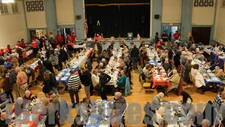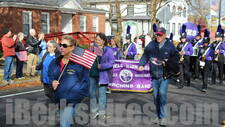iBerkshires.com Columnist SectionSue Bush
More articles from Sue Bush
Plan B OK For Women Over 18By Susan Bush
12:00AM / Thursday, August 24, 2006
 | | "Plan B" emergency contraception going over-the-counter for women age 18 and over. |
Federal Food and Drug Administration officials have given the nod to women over age 18 bypassing a doctor's prescription and acquiring emergency contraception marketed as "Plan B" as an over-the-counter purchase.
The announcement was made on Aug. 24. The transition to over-the-counter status is expected to occur over the next few months.
Officials of the drug's manufacturer, Barr Pharmaceuticals, Inc., reportedly said they plan to have over-the-counter supplies of "Plan B" stocked at pharmacies by year's end.
The emergency-use contraceptive is sold as a two-pill pack. "Plan B" is a brand name for the progestin hormone levonorgestrel. The emergency contraceptive has a recommended 72-hour use limit.
Changes For Patients And Pharmacies
Massachusetts and Vermont are among nine states that already allowed access to the contraceptive without the issue of a new prescription. But the new ruling eliminates several regulations associated with dispensing Plan B, said Nassif's Pharmacy owner Richard Czarnecki.
Under previous regulations, in Massachusetts, a physician would have had to write a "standing order" allowing pharmacists to dispense the contraception to patients. There was a tracking mechanism in place and each time the contraceptive was dispensed, a record of the transaction was filed with the state pharmacy overseers, Czarnecki said. A copy of the standing order was required to be on file at the pharmacy as well.
"There was a physician involved and there was required reporting," Czarnecki said. "With the action today, that's no longer true."
Czarnecki said that Nassif's did not have any existing physician standing orders to dispense the emergency contraception.
"Plan B" will be kept behind pharmacy counters and those seeking the contraceptive pack will be required to show a photograph identification as proof of age. The emergency measure will be treated as insulin, meaning that Nassif's pharmacists will record who buys the pills and how often as a way to reduce the chance that those old enough to purchase the pills aren't doing so for younger friends or siblings, Czarnecki said. Sales will be kept confidential, he said.
"We do not want it to get into the hands of people who are under age 18," he said, and noted that "Plan B" contraception is being made available to those under age 18 with a physician prescription per the FDA ruling.
Not Recommended For Frequent Use
Plan B is not an alternative to birth control mechanisms such as condoms, traditional birth control pills or patches and offers absolutely no protection against sexually transmitted disease, Czarnecki emphasized.
According to information provided to those who acquire the emergency contraceptive medication, "this medication is used in women to prevent pregnancy after birth control failure [e.g. broken condom] or unprotected sex. It is a progestin hormone that prevents pregnancy by preventing the release of an egg [ovulation] and changing the womb and cervical mucus to make it more difficult for an egg to meet sperm [fertilization] or attach to the wall of the womb [implantation]. This medication will not stop an existing pregnancy or protect you against sexually transmitted disease. This medication should not be used as a regular form of birth control."
The package information also describes side effects of Plan B use.
Czarnecki said he hopes that women understand that the medication has a very small window of effectiveness and is not effective 100 percent of the time. Plan B should not be relied on as a birth control mainstay nor should anyone engage in unprotected sex casually or regularly because of the risk of acquiring sexually transmitted diseases such as the HIV virus, chlamydia, or gonorrhea.
Issues Remain Despite OTC Status
In recent months, numerous media reports have publicized situations of pharmacist refusal to provide emergency contraception to women even if a physician-written prescription was provided. Refusals were reportedly based on right-to-life personal beliefs held by specific pharmacists.
No such situation has been reported in the media locally.
The American Pharmacists Association released a statement following the FDA decision. The association "applauds the Food and Drug Administration's plan to use pharmacists to expand access to medications," the statement reads.
"While the association does not take product-specific positions regarding the transition of products to non-prescription status, APhA supports the transition of suitable prescription drug products when supported by studies assessing the safety, efficacy,and appropriateness of such drugs for OTC use," the statement continues. "This novel approach expands consumer access to both the medication and pharmacist services-if women over age 18 have questions about using emergency contraception, they are already at the pharmacy counter and the pharmacist is more accessible to answer these questions."
The statement acknowledges the protocols which had existed in the nine "standing order" states and also urged employer pharmacies to "develop systems that support a pharmacist's ability to opt out of working with emergency contraception while providing a timely alternative for consumers."
"As the largest and first established organization representing all pharmacists across a variety of practice settings, the APhA will work with the FDA, its more than 57,000 members, as well as other healthcare providers to ensure that all patients needs are met with the highest quality of care without violating the personal beliefs of pharmacists," the statement concludes.
Susan Bush may be reached via e-mail at suebush@iberkshires.com or at 802-823-9367.
|
|
Advertise on
iBerkshires.com
|



















